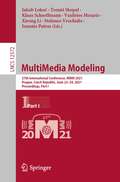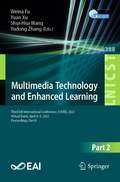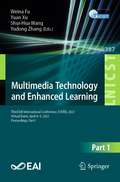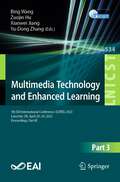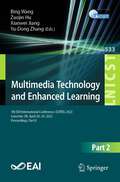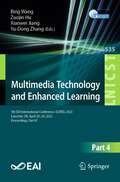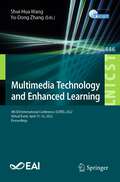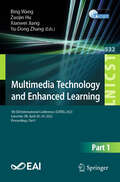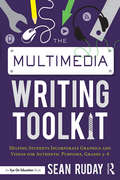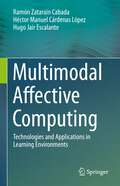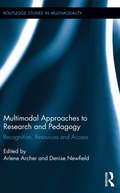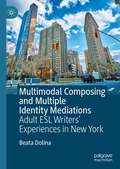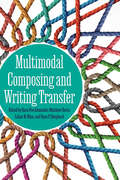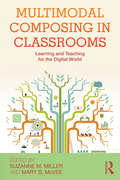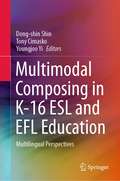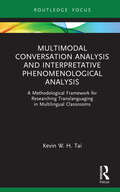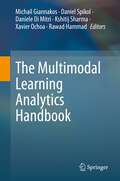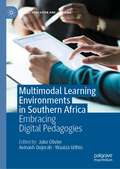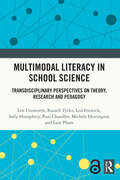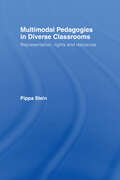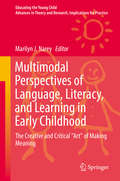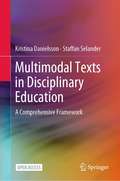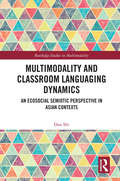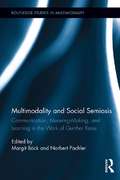- Table View
- List View
MultiMedia Modeling: 27th International Conference, MMM 2021, Prague, Czech Republic, June 22–24, 2021, Proceedings, Part I (Lecture Notes in Computer Science #12572)
by Stefanos Vrochidis Klaus Schoeffmann Vasileios Mezaris Jakub Lokoč Tomáš Skopal Xirong Li Ioannis PatrasThe two-volume set LNCS 12572 and 1273 constitutes the thoroughly refereed proceedings of the 27th International Conference on MultiMedia Modeling, MMM 2021, held in Prague, Czech Republic, in June2021. Of the 211 submitted regular papers, 40 papers were selected for oral presentation and 33 for poster presentation; 16 special session papers were accepted as well as 2 papers for a demo presentation and 17 papers for participation at the Video Browser Showdown 2021. The papers cover topics such as: multimedia indexing; multimedia mining; multimedia abstraction and summarization; multimedia annotation, tagging and recommendation; multimodal analysis for retrieval applications; semantic analysis of multimedia and contextual data; multimedia fusion methods; multimedia hyperlinking; media content browsing and retrieval tools; media representation and algorithms; audio, image, video processing, coding and compression; multimedia sensors and interaction modes; multimedia privacy, security and content protection; multimedia standards and related issues; advances in multimedia networking and streaming; multimedia databases, content delivery and transport; wireless and mobile multimedia networking; multi-camera and multi-view systems; augmented and virtual reality, virtual environments; real-time and interactive multimedia applications; mobile multimedia applications; multimedia web applications; multimedia authoring and personalization; interactive multimedia and interfaces; sensor networks; social and educational multimedia applications; and emerging trends.
Multimedia Technology and Enhanced Learning: Third EAI International Conference, ICMTEL 2021, Virtual Event, April 8–9, 2021, Proceedings, Part II (Lecture Notes of the Institute for Computer Sciences, Social Informatics and Telecommunications Engineering #388)
by Weina Fu Yuan Xu Shui-Hua Wang Yudong ZhangThis two-volume book constitutes the refereed proceedings of the 3rd International Conference on Multimedia Technology and Enhanced Learning, ICMTEL 2021, held in April 2021. Due to the COVID-19 pandemic the conference was held virtually. The 97 revised full papers have been selected from 208 submissions. They describe new learning technologies which range from smart school, smart class and smart learning at home and which have been developed from new technologies such as machine learning, multimedia and Internet of Things.
Multimedia Technology and Enhanced Learning: Third EAI International Conference, ICMTEL 2021, Virtual Event, April 8–9, 2021, Proceedings, Part I (Lecture Notes of the Institute for Computer Sciences, Social Informatics and Telecommunications Engineering #387)
by Weina Fu Yuan Xu Shui-Hua Wang Yudong ZhangThis two-volume book constitutes the refereed proceedings of the 3rd International Conference on Multimedia Technology and Enhanced Learning, ICMTEL 2021, held in April 2021. Due to the COVID-19 pandemic the conference was held virtually. The 97 revised full papers have been selected from 208 submissions. They describe new learning technologies which range from smart school, smart class and smart learning at home and which have been developed from new technologies such as machine learning, multimedia and Internet of Things.
Multimedia Technology and Enhanced Learning: 5th EAI International Conference, ICMTEL 2023, Leicester, UK, April 28-29, 2023, Proceedings, Part III (Lecture Notes of the Institute for Computer Sciences, Social Informatics and Telecommunications Engineering #534)
by Bing Wang Zuojin Hu Xianwei Jiang Yu-Dong ZhangThe four-volume set LNICST 532, 533, 534 and 535 constitutes the refereed proceedings of the 5th EAI International Conference on Multimedia Technology and Enhanced Learning, ICMTEL 2023, held in Leicester, UK, during April 28-29, 2023.The 121 papers presented in the proceedings set were carefully reviewed and selected from 285 submissions. They were organized in topical sections as follows: AI-based education and learning systems; medical and healthcare; computer vision and image processing; data mining and machine learning; workshop 1: AI-based data processing, intelligent control and their applications; workshop 2: intelligent application in education; and workshop 3: the control and data fusion for intelligent systems.
Multimedia Technology and Enhanced Learning: 5th EAI International Conference, ICMTEL 2023, Leicester, UK, April 28-29, 2023, Proceedings, Part II (Lecture Notes of the Institute for Computer Sciences, Social Informatics and Telecommunications Engineering #533)
by Bing Wang Zuojin Hu Xianwei Jiang Yu-Dong ZhangThe four-volume set LNICST 532, 533, 534 and 535 constitutes the refereed proceedings of the 5th EAI International Conference on Multimedia Technology and Enhanced Learning, ICMTEL 2023, held in Leicester, UK, during April 28-29, 2023.The 121 papers presented in the proceedings set were carefully reviewed and selected from 285 submissions. They were organized in topical sections as follows: AI-based education and learning systems; medical and healthcare; computer vision and image processing; data mining and machine learning; workshop 1: AI-based data processing, intelligent control and their applications; workshop 2: intelligent application in education; and workshop 3: the control and data fusion for intelligent systems.
Multimedia Technology and Enhanced Learning: 5th EAI International Conference, ICMTEL 2023, Leicester, UK, April 28-29, 2023, Proceedings, Part IV (Lecture Notes of the Institute for Computer Sciences, Social Informatics and Telecommunications Engineering #535)
by Bing Wang Zuojin Hu Xianwei Jiang Yu-Dong ZhangThe four-volume set LNICST 532, 533, 534 and 535 constitutes the refereed proceedings of the 5th EAI International Conference on Multimedia Technology and Enhanced Learning, ICMTEL 2023, held in Leicester, UK, during April 28-29, 2023.The 121 papers presented in the proceedings set were carefully reviewed and selected from 285 submissions. They were organized in topical sections as follows: AI-based education and learning systems; medical and healthcare; computer vision and image processing; data mining and machine learning; workshop 1: AI-based data processing, intelligent control and their applications; workshop 2: intelligent application in education; and workshop 3: the control and data fusion for intelligent systems.
Multimedia Technology and Enhanced Learning: 4th EAI International Conference, ICMTEL 2022, Virtual Event, April 15-16, 2022, Proceedings (Lecture Notes of the Institute for Computer Sciences, Social Informatics and Telecommunications Engineering #446)
by Shui-Hua Wang Yu-Dong ZhangThis proceedings, ICMTEL 2022, constitutes the refereed proceedings of the 4th International Conference on Multimedia Technology and Enhanced Learning, ICMTEL 2022, held in April 2022. Due to the COVID-19 pandemic the conference was held virtually.The 59 revised full papers have been selected from 188 submissions. They were organized in topical sections as follows: internet of things and communication; education and enterprise; machine learning; big data and signal processing; workshop of data fusion for positioning and navigation; and workshop of intelligent systems and control.
Multimedia Technology and Enhanced Learning: 5th EAI International Conference, ICMTEL 2023, Leicester, UK, April 28-29, 2023, Proceedings, Part I (Lecture Notes of the Institute for Computer Sciences, Social Informatics and Telecommunications Engineering #532)
by Yu-Dong Zhang Bing Wang Zuojin Hu Xianwei JiangThe four-volume set LNICST 532, 533, 534 and 535 constitutes the refereed proceedings of the 5th EAI International Conference on Multimedia Technology and Enhanced Learning, ICMTEL 2023, held in Leicester, UK, during April 28-29, 2023.The 121 papers presented in the proceedings set were carefully reviewed and selected from 285 submissions. They were organized in topical sections as follows: AI-based education and learning systems; medical and healthcare; computer vision and image processing; data mining and machine learning; workshop 1: AI-based data processing, intelligent control and their applications; workshop 2: intelligent application in education; and workshop 3: the control and data fusion for intelligent systems.
The Multimedia Writing Toolkit: Helping Students Incorporate Graphics and Videos for Authentic Purposes, Grades 3–8
by Sean RudayThe Multimedia Writing Toolkit demonstrates how, by drawing on students’ interest in and familiarity with technology, you can integrate multimedia to maximize the potential of writing instruction. In eight concise chapters, author Sean Ruday identifies and describes simple, common forms of multimedia that upper-elementary and middle school students can use to improve their argument, informational, and narrative writing and critical thinking. You’ll learn how to: Incorporate multimedia into argument, informational, and narrative writing through students’ use of video topic trailers, online discussion boards, webpages, and more. Evaluate students on effective use of multimedia through easy-to-follow rubrics and explicitly articulated learning goals. Understand more fully the key forms of multimedia through user-friendly overviews and explanations; you don’t need to be a "techie" teacher to use these strategies! Overcome possible obstacles to the integration of multimedia in the classroom by learning from the author’s concrete, first-hand examples and instructional recommendations. This book is complete with resources designed to provide you with extra support, including reproducible classroom-appropriate charts and forms, links to key web-based content discussed in the book, and a guide for teachers and administrators interested in using the book for group-based professional development. With The Multimedia Writing Toolkit, you’ll have a clear game plan for encouraging your students to become more engaged, technologically savvy learners. Bonus: Blank templates of the handouts are available as printable eResources on our website (www.routledge.com/9781138200111).
Multimodal Affective Computing: Technologies and Applications in Learning Environments
by Ramón Zatarain Cabada Héctor Manuel López Hugo Jair EscalanteThis book explores AI methodologies for the implementation of affective states in intelligent learning environments. Divided into four parts, Multimodal Affective Computing: Technologies and Applications in Learning Environments begins with an overview of Affective Computing and Intelligent Learning Environments, from their fundamentals and essential theoretical support up to their fusion and some successful practical applications. The basic concepts of Affective Computing, Machine Learning, and Pattern Recognition in Affective Computing, and Affective Learning Environments are presented in a comprehensive and easy-to-read manner. In the second part, a review on the emerging field of Sentiment Analysis for Learning Environments is introduced, including a systematic descriptive tour through topics such as building resources for sentiment detection, methods for data representation, designing and testing the classification models, and model integration into a learning system. The methodologies corresponding to Multimodal Recognition of Learning-Oriented Emotions are presented in the third part of the book, where topics such as building resources for emotion detection, methods for data representation, multimodal recognition systems, and multimodal emotion recognition in learning environments are presented. The fourth and last part of the book is devoted to a wide application field of the combination of methodologies, such as Automatic Personality Recognition, dealing with issues such as building resources for personality recognition, methods for data representation, personality recognition models, and multimodal personality recognition for affective computing. This book can be very useful not only for beginners who are interested in affective computing and intelligent learning environments, but also for advanced and experts in the practice and developments of the field. It complies an end-to-end treatment on these subjects, especially with educational applications, making it easy for researchers and students to get on track with fundamentals, established methodologies, conventional evaluation protocols, and the latest progress on these subjects.
Multimodal Approaches to Research and Pedagogy: Recognition, Resources, and Access (Routledge Studies in Multimodality)
by Arlene Archer Denise NewfieldThis book brings together social semiotics, cultural studies, multiliteracies, and other approaches in order to theorize very different learning environments, giving visibility to the modal effect in a range of disciplines. It highlights the ideological nature of discursive practices, examines questions of access, and argues for transformation of these practices, with a constant eye on issues of social justice and equity. Contributors argue that we can harness learners’ representational resources through making these resources visible, and creating less regulated spaces in the curriculum in which they can be used. Examples from primary education through to adult continuing education are used throughout the text.
Multimodal Composing and Multiple Identity Mediations: Adult ESL Writers' Experiences in New York
by Beata DolinaThis book examines the experiences of adult ESL (English as a Second Language) learners in New York, paying particular attention to the relationship between their professional identities and multimodal composing practices in English classroom. The author uses an (auto-)ethnographic framework to investigate how previously-constructed identities of a professional nature aided the students in the design of multimodal texts including photographs and written material in English. This small-scale study is contextualised in relation to current research in the fields of multimodality, identity construction and teaching methodology, and the author also draws on Kress' theory of visual semiotics. Finally, the book provides detailed descriptions and suggestions for multimodal lessons which could be delivered in ESL classrooms in other settings, including multimodal roleplays, theatre games, and model discussion questions and answers. This book will be of interest to ESL/EFL and TESOL researchers and practitioners, as well as pre-service teachers and MA TESOL students.
Multimodal Composing and Writing Transfer
by Kara Poe Alexander Matthew Davis Lilian W. MinaMultimodal Composing and Writing Transfer explores transfer across various contexts of multimodal composing, extending the early conversations connecting multimodality to writing. Contributors address how writing transfer theories intersect with multimodal composing and present methods for facilitating transfer across modes and media, offering insight into how writers can learn to compose when they encounter familiar modes in new contexts. Over the past two decades the concepts of multimodal composing and writing transfer have grown and reshaped the nature of writing studies, but rarely have the ways in which these areas overlap been studied. This collection shows how this shift in writing studies has been mutually informative, covering a wider range of contexts for multimodality and writing transfer than just in first-year composition courses. It places composition teaching practices and multimodal research in conversation with learning transfer theory to provide an in-depth examination of how they influence one another. Multimodal Composing and Writing Transfer develops these intersections to connect multimodal composition and writing practices across a wide array of fields and contexts. Scholars across disciplines, postsecondary writing teachers, writing program administrators, writing center directors, and graduate students will find this collection indispensable.
Multimodal Composing in Classrooms: Learning and Teaching for the Digital World
by Suzanne M. Miller Mary B. McVeeTaking a close look at multimodal composing as an essential new literacy in schools, this volume draws from contextualized case studies across educational contexts to provide detailed portraits of teachers and students at work in classrooms. Authors elaborate key issues in transforming classrooms with student multimodal composing, including changes in teachers, teaching, and learning. Six action principles for teaching for embodied learning through multimodal composing are presented and explained. The rich illustrations of practice encourage both discussion of practical challenges and dilemmas and conceptualization beyond the specific cases. Historically, issues in New Literacy Studies, multimodality, new literacies, and multiliteracies have primarily been addressed theoretically, promoting a shift in educators’ thinking about what constitutes literacy teaching and learning in a world no longer bounded by print text only. Such theory is necessary (and beneficial for re-thinking practices). What Multimodal Composing in Classrooms contributes to this scholarship are the voices of teachers and students talking about changing practices in real classrooms.
Multimodal Composing in K-16 ESL and EFL Education: Multilingual Perspectives
by Dong-Shin Shin Tony Cimasko Youngjoo YiThis book offers a comprehensive view of multimodal composing and literacies in multilingual contexts for ESL and EFL education in United States of America and globally. It illustrates the current state of multimodal composing and literacies, with an emphasis on English learners' language and literacy development. The book addresses issues concerning multilinguals' multimodal composing and reflects on what the nexus of multimodality, writing development, and multilingual education entails for future research. It provides research-driven and practice-oriented perspectives of multilinguals' multimodal composing, drawing on empirical data from classroom contexts to elucidate aspects of multimodal composing from a range of theoretical perspectives such as multiliteracies, systemic functional linguistics, and social semiotics. This book bridges the gap among theory, research, and practice in TESOL and applied linguistics. It serves as a useful resource for scholars and teacher educators in the areas of applied linguistics, second language studies, TESOL, and language education.
Multimodal Conversation Analysis and Interpretative Phenomenological Analysis: A Methodological Framework for Researching Translanguaging in Multilingual Classrooms (Qualitative and Visual Methodologies in Educational Research)
by Kevin W. TaiThis book presents the methodological framework of combining Multimodal Conversation Analysis (MCA) with Interpretative Phenomenological Analysis (IPA) to interpretively analyse translanguaging practices in educational contexts. Beginning with an overview of the three uses of translanguaging—translanguaging as a theory of language, as a pedagogical practice, and as an analytical perspective—the book goes on to critically examine the different methodological approaches for analysing translanguaging practices in multilingual classroom interactions. It explains how MCA and IPA are useful methodologies for understanding how and why translanguaging practices are constructed by participants in the classroom and discusses types of data collected and data collection procedures. The author, Kevin W. H. Tai, shows how combining these approaches enables researchers to study how translanguaging practices are constructed in multilingual classrooms and how teachers make sense of their own translanguaging practices at particular moments of classroom interaction. This detailed and concise guide is indispensable for students, practitioners, policymakers, and researchers from across the globe, particularly those working in the fields of applied linguistics and language education.
Multimodal Funds of Knowledge in Literacy: Countering Deficit Narratives of Diverse Families
by Sally Brown Rong ZhangApplying an asset-based approach, Multimodal Funds of Knowledge in Literacy prepares educators to teach and support diverse students and their families as they negotiate multimodal aspects of literacy learning. Framed by sociocultural theory, multiliteracies, multimodality, and posthumanism, the text combats deficit narratives by providing concrete alternatives that push educators to rethink their practices and support students’ and families’ cultural and linguistic strengths.Chapters include case studies, vignettes, prompts, and learning samples that will leave readers with valuable insights and new understandings of multimodal funds of knowledge. Comprehensive and instructive, this book is a key text in literacy education, family literacy, and community engagement.
The Multimodal Learning Analytics Handbook
by Michail Giannakos Daniel Spikol Daniele Di Mitri Kshitij Sharma Xavier Ochoa Rawad HammadThis handbook is the first book ever covering the area of Multimodal Learning Analytics (MMLA). The field of MMLA is an emerging domain of Learning Analytics and plays an important role in expanding the Learning Analytics goal of understanding and improving learning in all the different environments where it occurs. The challenge for research and practice in this field is how to develop theories about the analysis of human behaviors during diverse learning processes and to create useful tools that could augment the capabilities of learners and instructors in a way that is ethical and sustainable. Behind this area, the CrossMMLA research community exchanges ideas on how we can analyze evidence from multimodal and multisystem data and how we can extract meaning from this increasingly fluid and complex data coming from different kinds of transformative learning situations and how to best feed back the results of these analyses to achieve positive transformative actions on those learning processes. This handbook also describes how MMLA uses the advances in machine learning and affordable sensor technologies to act as a virtual observer/analyst of learning activities. The book describes how this “virtual nature” allows MMLA to provide new insights into learning processes that happen across multiple contexts between stakeholders, devices and resources. Using such technologies in combination with machine learning, Learning Analytics researchers can now perform text, speech, handwriting, sketches, gesture, affective, or eye-gaze analysis, improve the accuracy of their predictions and learned models and provide automated feedback to enable learner self-reflection. However, with this increased complexity in data, new challenges also arise. Conducting the data gathering, pre-processing, analysis, annotation and sense-making, in a way that is meaningful for learning scientists and other stakeholders (e.g., students or teachers), still pose challenges in this emergent field. This handbook aims to serve as a unique resource for state of the art methods and processes. Chapter 11 of this book is available open access under a CC BY 4.0 license at link.springer.com.
Multimodal Learning Environments in Southern Africa: Embracing Digital Pedagogies (Digital Education and Learning)
by Jako Olivier Avinash Oojorah Waaiza UdhinThis book offers an important overview of technology-enhanced education in Southern Africa. With original research from Malawi, Mauritius, Namibia, South Africa, Tanzania and Zimbabwe, this book provides in-depth scientific scholarship focused on the dynamic multimodal learning environments in the region. With the onset of the COVID-19 pandemic, the world has largely had to adjust to remotelearning. Hence, the editors and contributors pull together important research on digital pedagogies and assessment to demonstrate how technology can be effectively employed for multimodal learning environments within the Southern African context. This book will be of interest and value to scholars of digital education, multimodal learning and education within Southern Africa and beyond.
Multimodal Literacy in School Science: Transdisciplinary Perspectives on Theory, Research and Pedagogy
by Len Unsworth Russell Tytler Lisl Fenwick Sally Humphrey Paul Chandler Michele Herrington Lam PhamThis book establishes a new theoretical and practical framework for multimodal disciplinary literacy (MDL) fused with the subject-specific science pedagogies of senior high school biology, chemistry and physics. It builds a compatible alignment of multiple representation and representation construction approaches to science pedagogy with the social semiotic, systemic functional linguistic-based approaches to explicit teaching of disciplinary literacy. The early part of the book explicates the transdisciplinary negotiated theoretical underpinning of the MDL framework, followed by the research-informed repertoire of learning experiences that are then articulated into a comprehensive framework of options for the planning of classroom work. Practical adoption and adaptation of the framework in biology, chemistry and physics classrooms are detailed in separate chapters. The latter chapters indicate the impact of the collaborative research on teachers' professional learning and students’ multimodal disciplinary literacy engagement, concluding with proposals for accommodating emerging developments in MDL in an ever-changing digital communication world. The MDL framework is designed to enable teachers to develop all students' disciplinary literacy competencies. This book will be of interest to researchers, teacher educators and postgraduate students in the field of science education. It will also have appeal to those in literacy education and social semiotics.
Multimodal Pedagogies in Diverse Classrooms: Representation, Rights and Resources
by Pippa SteinMultimodal Pedagogies in Diverse Classrooms examines how the classroom can become a democratic space founded on the integration of different histories, modes of representation, feelings, languages and discourses, and is essential reading for anyone interested in the connection between multimodality, pedagogy, democracy and social justice in diverse classrooms. Pippa Stein combines theory with material taken from post-apartheid classrooms in South Africa where students from different language and cultural backgrounds negotiate the ongoing tensions between tradition and modernity, Western and African intellectual thought, as well as the apartheid-past of their parents, and their own aspirations for the future. This insightful book argues that classrooms can become ‘transformative’ sites in which students can develop curricula and pedagogies which speak to the diversity of global societies, and looks at: How multimodality can be used to promote social justice and democracy in diverse classrooms; The forms of representation through which students make meaning in classrooms; How those forms contribute to the building of democratic cultures; The cultural resources available to students, and how they are used for learning; Difference as a productive energy for learning. Dealing with issues such as democracy, politics of difference, diversity, multicultural and multilingual classrooms, this book is as pertinent to readers across the globe as it is to those in South Africa, and will be invaluable and fascinating reading for anyone working or interested in this field.
Multimodal Perspectives of Language, Literacy, and Learning in Early Childhood
by Marilyn J. NareyOur image-rich, media-dominated culture prompts critical thinking about how we educate young children. In response, this volume provides a rich and provocative synthesis of theory, research, and practice that pushes beyond monomodal constructs of teaching and learning. It is a book about bringing "sense" to 21st century early childhood education, with "sense" as related to modalities (sight, hearing), and "sense" in terms of making meaning. It reveals how multimodal perspectives emphasize the creative, transformative process of learning by broadening the modes for understanding and by encouraging critical analysis, problem solving, and decision-making. The volume's explicit focus on children's visual texts ("art") facilitates understanding of multimodal approaches to language, literacy, and learning. Authentic examples feature diverse contexts, including classrooms, homes, museums, and intergenerational spaces, and illustrate children's "sense-making" of life experiences such as birth, identity, environmental phenomena, immigration, social justice, and homelessness. This timely book provokes readers to examine understandings of language, literacy, and learning through a multimodal lens; provides a starting point for constructing broader, multimodal views of what it might mean to "make meaning;" and underscores the production and interpretation of visual texts as meaning making processes that are especially critical to early childhood education in the 21st century.
Multimodal Texts in Disciplinary Education: A Comprehensive Framework
by Kristina Danielsson Staffan SelanderThis open access book provides an introduction to multimodality and the role of multimodal texts in today’s education. Presenting a comprehensive framework for analysing and working with multimodal texts in disciplinary education, it serves as a tool for researchers and teachers alike. The second part of the book focuses on sample analyses of a variety of educational texts for different age groups and from different disciplines, including games and online resources. The authors also comment on the specific challenges of each text, and how teachers can discuss such texts with their students to enhance both their understanding of the content and their multimodal literacy. The book is intended for researchers in fields like education and multimodal studies, and for teacher educators, regardless of school subject or age group. With the combined perspectives on text analysis and implications for education, the book addresses the needs of teachers who want to work with multimodal aspects of texts in education in informed ways, but lack the right tools for such work.
Multimodality and Classroom Languaging Dynamics: An Ecosocial Semiotic Perspective in Asian Contexts (Routledge Studies in Multimodality)
by Dan ShiThis practical analytical guide to classroom languaging dynamics in L2 tertiary classrooms integrates multimodality, sociological theory of education and ecosocial semiotic perspectives. It offers a theoretical and methodological framework for conducting multimodal analysis of meaning-making processes in different pedagogical settings. The multimodal investigation of real-time classroom interactivity showcases an embodied coordination of vocalization and gesticulation in classroom interactions, where it varies from students’ solo speech in individual presentations, to teacher-student interactions in group discussions, and to student-student interactions in role-play. With a unified conceptual framework articulating both the macro and micro analysis, this book proposes more ecological-based approaches to language and unpacks a multi-scalar analytical framework to open up for an embodied analysis of meaning-making processes in multimodal interaction analysis. The rich systematic analysis built upon the ecosocial semiotic approach illustrates in practice how theoretical frameworks link to empirical data analysis through exemplified analytical processes and practices, and demonstrates the value of how multimodal interaction analysis contributes to the understanding of the cognitive dynamics of languaging activities that take place in L2 educational contexts. The book provides not only a practical methodological guide to multimodal interaction analysis, but also hands-on analytical references to multimodal classroom research in the field. In addition to early career scholars and PhD students, this volume will be valuable for international academics looking for complementary frameworks or approaches to multimodality, particularly in the L2 Asian contexts.
Multimodality and Social Semiosis: Communication, Meaning-Making, and Learning in the Work of Gunther Kress (Routledge Studies in Multimodality)
by Margit Böck Norbert PachlerGunther Kress, one of the founders of social semiotics and multimodality, has made lasting contributions to these fields through his work in semiotics and meaning-making; power and identity; agency, design, production; and pedagogy and learning; in varied sites of transformation. This book brings together leading scholars in a variety of disciplines, including social semiotics, pedagogy, linguistics, media and communication studies, new literacy studies, ethnography, academic literacy, literary criticism and, more recently, medical/clinical education, to examine and build upon his work. This disciplinary diversity is evidence of the ways in which Kress' work has influenced and been influenced by a wide range of academic work and intellectual endeavors and how it has been used to lay foundations for theory-building and concept development in a varied yet connected range of areas. The individual contributions to the book pick up the threads of the often collaborative work of the authors with Kress; they show how these approaches were subsequently developed and discuss what future trajectories the authors see for them.
